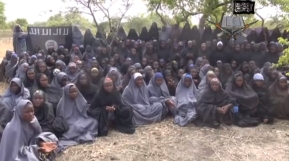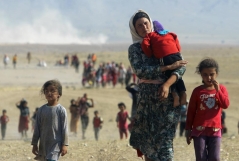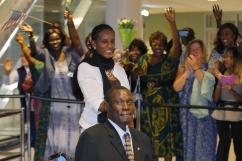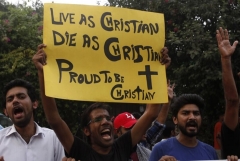
This month, two girls who had been kidnapped and subject to forced conversion and marriage in northern Nigeria were returned to their families after unprecedented public pressure. Their plight has put the spotlight on an issue that goes largely unremarked outside of the region.
Fourteen-year-old Ese Rita Oruru, from Bayelsa State in the south of the country, was allegedly abducted on 12 August 2015 by a man called Yunusa Dahiru, also known as "Yellow". A regular customer at her mother's food store, he took Ese, then aged 13, over 800km away to Kano State in the predominantly Muslim north of Nigeria, where she was obliged to change her religion and name, and was "married".
Multiple attempts by Ese's family to secure her release were unsuccessful and it was only after a social media campaign went viral that she was eventually released on 29 February 2016. In the days following her daughter's disappearance, her mother, Rose, made a perilous journey to Dahiru's home area in Kano State to get her back but was insulted by the village chief. He said that her daughter had converted to Islam, changed her name to Aisha, and was now "married" and in the custody of the Emir of Kano, Sanusi Lamido Sanusi II.
Despite warnings not to go to the Emir's palace, Mrs Oruru went to petition for her daughter's release. On at least two occasions she was insulted and assaulted by irate youth. Even when accompanied by police officers, she was refused direct access to her daughter and eventually had to return home.
The turning point came 24 hours after local newspaper Punch launched a #FreeEse campaign that resonated with Nigerians across social media both at home and abroad. Ese was finally reunited with her mother in the capital Abuja on 2 March. Her father later revealed that she was five months pregnant.
The publicity around her case also galvanised calls for the release of another 14 year-old girl, Patience Paul, who was also abducted on 12 August 2015 in Sokoto State, northern Nigeria. She was allegedly taken by two neighbours who were accompanied by the Hisba (Shari'a enforcement) group and taken to the palace of the Sultan of Sokoto, the foremost Muslim traditional ruler in Nigeria and the spiritual leader of the faith community. Patience's brother raised the alarm about her abduction on Facebook, but her case only gained traction in the public consciousness after Ese's campaign went viral. As publicity grew, the Sokoto State Human Rights Commission initiated an investigation into Patience's disappearance and discovered that she had been "married" to a man who had taken her to Bauchi State. She was traced to the home of a man named Malam Ibrahim, also known as the "king of strangers", on the evening of 4 March and returned to her family.

These cases highlight longstanding concerns about the abduction, forced conversion and forcible marriage of non-Muslim minors, which is particularly prevalent in rural areas of Shari'a states in northern Nigeria. Christian Solidarity Worldwide continues to document several cases of child abductions and in 2010 made a submission to the United Nations Committee on the Rights of the Child that highlighted this phenomenon.
What makes Ese's case startling is that she was taken from a southern State, and many question whether the case would have made headlines had the entire event occurred only in the north.
Parents seeking the release of abducted daughters are generally informed they have converted, married, are in the custody of local traditional rulers and do not wish to return home. Appeals to law enforcement agencies for assistance generally prove ineffective amidst assertions by abductors that the girls are not minors. However, under Nigerian law anyone below the age of 18 is a minor. Nigeria's Penal Code punishes child abduction and carnal knowledge of minors with jail terms and there are also penalties for anyone involved in child betrothal and child marriage.
In addition to press and public attention, local NGOs such as Muslim Rights Concern have condemned these abductions. In a tweet issued on 29 February referring to Ese's case, Senator Aisha Jummai Alhassan, Minister of Women Affairs and Social Development, stated that, "no culture, religion or personal conviction supersedes the laws of the Federal Republic of Nigeria."
The public pressure for the release of the two girls appears to have taken traditional authorities, who implicitly or explicitly sanction these acts, by surprise and may embolden more families to seek redress, forcing the authorities to tackle the issue effectively. Five parents have now come forward each demanding help to ensure the release of their daughters, one of whom was 12 at the time of her abduction.
Similar to the Orurus, who struggled to get their daughter back even when accompanied by police and who were informed repeatedly to give up on their campaign by law enforcement officials, these cases suggest an inequality before the law that is unacceptable in a multi-religious and multi-ethnic nation. While Boko Haram's abductions have rightly drawn headlines, these sorts of abductions, which predate those of Boko Haram, receive less coverage. The only difference between them is that instead of trafficking girls to ungoverned spaces, these abductors attempt to hide behind traditional authorities who may or may not have condoned their actions.
Our fervent hope is that Ese and Patience's case will spur the Nigerian authorities to be proactive in ensuring the swift return of all abducted minors and to prosecute the individuals, local authorities or organisations that are complicit in such activity. No parent should have to struggle the way the Orurus did to get their daughter back. The culture of impunity surrounding child abductions must end.
Kiri Kankhwende is press officer for Christian Solidarity Worldwide.


















